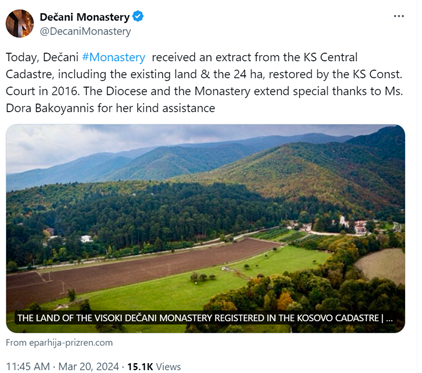Historic vote – Kosovo’s breakthrough – a Unicorn
- Under dark clouds – in a dangerous world
- Unexpected breakthrough
- A letter from Belgrade or how Serbia is losing the argument
- A political unicorn
Dear friends of ESI,
Nobody expected this historic vote even two months ago:
131:29
Last week, on 16 April, Europe’s leading human rights institution sent a loud message from Strasbourg to governments across the continent. With 131 to 29 votes, parliamentarians from 46 European democracies agreed by a huge majority, based on four detailed reports, that:
“Kosovo’s aspirations to join the Council of Europe should be met with a positive response.”
“Kosovo’s legal framework is broadly in line with Council of Europe standards and that its Constitution is a very progressive instrument.”
The Parliamentary Assembly of the Council of Europe (PACE) acknowledged the “progress made by Kosovo in the areas of human rights, democracy and the rule of law.” It called on the 46 member state governments of the Council of Europe to admit Kosovo at the next meeting of foreign ministers in the middle of May 2024.
This would mark a big success for the Council of Europe. 75 years ago, when it was created in London in April 1949, it had ten members. Following Kosovo’s accession, it would have 47, and include every European democracy.
Under dark clouds – in a dangerous world
Only two months ago, in late February 2024, Kosovo was facing both growing threats from Serbia and growing tensions with its traditional allies. At the time, even leading supporters of Kosovo’s accession to the Council of Europe had given up hope that it could happen this year.
Threats from Serbia had been intensifying for months. Last summer, on 14 June 2023, Serbian special police forces abducted three Kosovo border police officers and kept them as prisoners for twelve days. On 23 June, Kosovo police stopped a Serb car moving weapons in the North of Kosovo. On 24 September 2023, heavily armed Serb paramilitaries attacked Kosovo police in the North of Kosovo, killing one. The Serb paramilitaries then barricaded themselves in the Orthodox Banjska Monastery. In the exchange of fire with the Kosovo police, three of the assailants were shot.
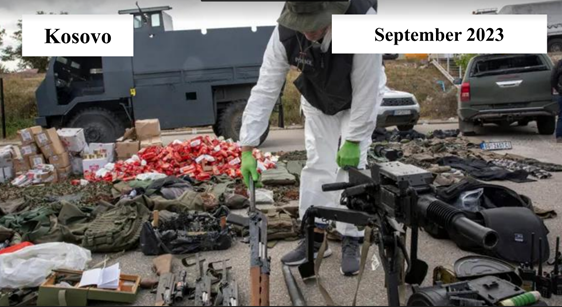
Weapons seized on 24 September 2023 in the North of Kosovo
Following this attack, a large number of sophisticated weapons was seized by Kosovo authorities, enough to equip dozens of fighters. The leader of the paramilitary group escaped back to Serbia. On 3 October, European Commissioner Janez Lenarcic told the European Parliament that: “The scale of this operation [on 24 September] is unprecedented. The quantity of confiscated weapons is massive … the situation in the North of Kosovo is extremely serious.” On 9 January 2024, UK Foreign Secretary David Cameron told the UK Foreign Affairs Committee:
“We have a very clear picture of what happened that day [on 24 September] … If you look at the amount of weapons that were brought to Kosovo and the number of people, if this group had not been stopped by the operation of the Kosovo Police, there would have been a series of attacks on the stations of the Kosovo Police, there would have been barricades in the streets ... they didn't just have weapons, they were equipped with very heavy equipment.”
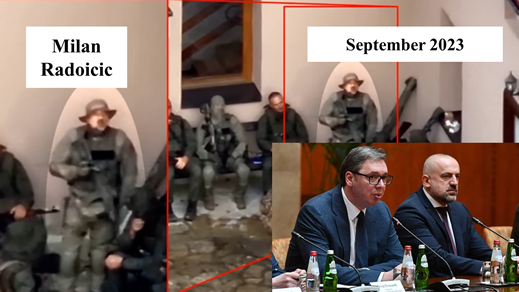
Leader of Serb paramilitaries on 24 September 2023 in Kosovo and with
Serbian president Aleksandar Vucic
The leader of the paramilitary group was filmed in the monastery and then quickly identified: It was Milan Radoicic, the strongman of North Mitrovica. Radoicic is the deputy leader of the dominant Kosovo Serb political party Serbian List, and an ally of Serbian president Aleksandar Vucic. Milan Radoicic admitted in a press conference in Serbia that he had led the attack. He had long been infamous for intimidation and violence targeting Serbs in Kosovo.
On 3 October 2023, the US State Department noted that there had also been an alarming Serbian military build-up on the Kosovo border: “We’ve been monitoring an unprecedented staging of advanced Serbian artillery, tanks, and mechanized infantry units, along the border with Kosovo. And we’ve called on Serbia to withdraw forces from the border.” That day, Aleksandar Vucic explained on television that Anthony Blinken, the US Secretary of State, had been impressed by this buildup of military force:
“In that phone call I was able to notice that for the first time he [Blinken] was emotional. I realized why. It was not about the number of soldiers present there … Last year we had 14,000, and now we had 8,400 soldiers … But what got them scared there, ah, it is silly to say that a small country like Serbia scared anyone, but let me say, what got them worried is that for the first time we brought some of our sophisticated weapons. We did not bring to the border our usual weapons, such as a couple of tanks and armored vehicles. We brought more sophisticated weapons. Serbia has been seriously strengthened lately.”
Strikingly, despite the 24 September attack, despite the killed Kosovo police officer, despite the many illegal weapons found, and despite the continuing impunity of Radoicic in Serbia, ignoring an international arrest warrant, it was the relationship between Kosovo and its traditional partners, EU member states and the US, that seemed to reach a low point in early 2024.
In mid-February 2024, senior US officials publicly complained about a “deteriorating relationship” between Kosovo and the United States. Relations with the EU looked equally strained. On 14 June 2023, the day of the kidnapping of the three Kosovo police officers in the North of Kosovo, the European Commission announced so-called “negative measures” (= sanctions) against Kosovo. Since then, the European Commission has not proposed to lift these “negative measures.” It kept them after the attack on 24 September. It also kept them after the European Parliament called for them to be lifted in October 2023.
Unexpected breakthrough
Then something happened that few had expected. Kosovo’s government took the bull by the horns, and within days removed all obstacles on the road to Council of Europe accession.
On 3 March 2024, Kosovo prime minister Albin Kurti sent a letter to all members of the Bureau of the Parliamentary Assembly of the Council of Europe (PACE) and its rapporteur, former Greek foreign minister Dora Bakoyannis, who evaluated Kosovo’s application for membership of the Council of Europe. Kurti committed his government to take “all steps to assist PACE in taking a favourable position on our membership application in the April [2024] PACE session.”
On 13 March, Kurti announced that the single most important obstacle identified by legal experts advising the Council of Europe on Kosovo’s accession would be overcome immediately: the Decani monastery land issue. The government pressured the Kosovo Cadastral Agency, which had refused to implement both Supreme and Constitutional Court decisions for many years, to do so now without delay.
ESI Memo on the Decani issue – 4 March 2024
A monastery, Kosovo courts and the Council of Europe
This was a breakthrough. On 20 March, Decani monastery acknowledged that it had received the cadastral records for all its disputed land. It thanked the Council of Europe rapporteur.
Next, the Kosovo government launched an unprecedented diplomatic outreach towards all key actors in the Council of Europe. On 22 March, Kosovo’s president, prime minister, and speaker of the Parliament sent a joint letter to PACE rapporteur Dora Bakoyannis, committing their institutions to resolve all identified human rights concerns.
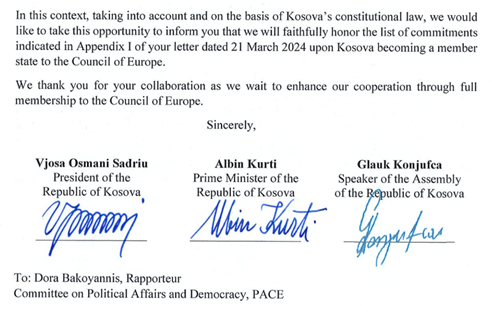
The joint letter addressed all open issues raised by PACE, including the matter of an Association of Serb Majority Municipalities (ASM). Kosovo’s leaders promised to “take substantial and tangible steps” on this “as soon as possible”:


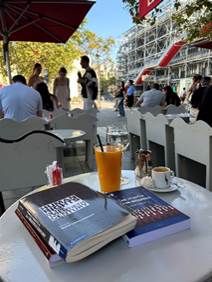
Paris decision on Kosovo, 27 March 2024
On 27 March, following the Decani breakthrough and this letter of commitment, a first historic vote took place in the PACE Political Affairs Committee in Paris. Here, 31 PACE committee members voted for the Bakoyannis report, which recommended admitting Kosovo to the Council of Europe. Only 4 voted against it (two from Serbia, one each from Montenegro and Bosnia and Herzegovina).
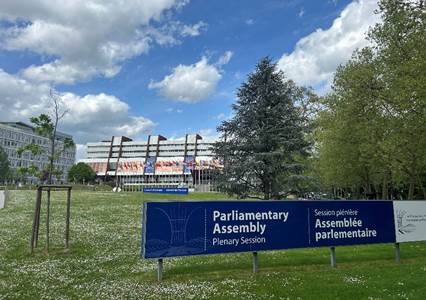
Strasbourg decision on Kosovo, 15 April 2024
On 15 April, two more PACE committees - the Committee on Equality and Non-discrimination and the Committee on Legal Affairs and Human Rights – also voted on Kosovo, this time in Strasbourg. This provided further momentum: both recommended Kosovo’s accession. The decision in the Committee on Legal Affairs was unanimous, after the Serb members walked out before the final vote.
With this, the road was open for the big showdown in the PACE plenary session in the afternoon of 16 April in Strasbourg. The vote there was preceded by an intense and long debate, as speaker after speaker rose to support the report of Bakoyannis and the recommendation of the three PACE committees to admit Kosovo: Christian-Democrats, Liberals, Social-Democrats, Greens; including parliamentarians from Greece, Romania, Germany, Ukraine, Italy and Armenia. As one German member of PACE, Knut Abraham (CDU), put it:
“I hope for strong support in this Assembly today. By that we also send a strong message, a strong signal to the Committee of Ministers to take a positive decision on Kosovo's membership this May. I will personally take this message to Berlin, and I hope that all of you will take it to your national capitals.
Let me highlight one key issue, the protection of minorities in Kosovo, in particular the Serb minority of Kosovo. It makes no sense to deny them access to the instruments this institution can offer: rapporteurs, monitors and especially the most remarkable human rights court in the world, the European Court of Human Rights.”
Another German member, Frank Schwabe (SPD) argued:
“The Committee of Ministers, the governments, asked us for our opinion on the request of Kosovo to become a member of this organisation. We will give our answer, a clear answer, today. It is a clear message. There is no reason, then, not to decide in May [2024], in the ministerial meeting, on this request.
This Council of Europe, with our own values and rules, has its own dignity. Please do not mix it with other institutions. We are not the European Union. We are not the Quint group [US, UK, Germany, France, Italy]. They have their reasons, but we have our reasons. We are quite proud that we could reach something with our rapporteur that others could not reach until now.”
The concluding words of Serbian Socialist MP, Dunja Simonovic Bratic did not convince other MPs: “Please mark my words, because they are the words of all Serbian people: Kosovo was Serbia, Kosovo is Serbia and Kosovo will always be Serbia.” Strikingly, MPs from many countries which have not even recognised Kosovo yet – Greece, Romania, Ukraine, Armenia – argued and voted for Kosovo to join. This led to the remarkable result of 131 votes for its accession and only 29 against.
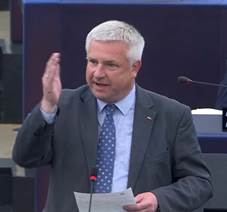

Knut Abraham for, Dunja Simonovic Bratic against Kosovo’s accession - Strasbourg
The transcript of a historic debate – 16 April 2024
The ball is now in the court of the 46 governments represented in the Committee of Ministers. They had asked for PACE’s opinion in 2023. They received a clear response. To admit Kosovo requires 31 votes in favour. It now needs to be put to the vote at the annual meeting of ministers on 16-17 May.
But will it be? Not if Serbia’s president Vucic gets his way. Serbia’s president has openly vowed to make every effort to stop Kosovo’s accession to the Council of Europe.
A letter from Belgrade or how Serbia is losing the argument
On 12 April, four days before the big PACE vote, Serbian president Aleksandar Vucic sent many long and angry letters to the leaders of Council of Europe member states, focusing on, as he put it, “the application by the so-called Kosovo for membership to the Council of Europe.”
In these letters, Vucic makes five arguments: Kosovo has not met Council of Europe standards; there is state terror in Kosovo against Serbs; the evidence for this terror is a sharp decline in the number of Kosovo Serbs; the reference to “post-accession conditions” in the Bakoyannis report is fraud; and, before anything else happens at all, there must first be a Community of Serb-majority municipalities established in Kosovo. With these arguments, Vucic appeals to European leaders to postpone any vote on Kosovo’s accession, in the hope that in this way the vote might never actually happen, PACE will be humiliated for having supported Kosovo and its vote and recommendation will be shown to be irrelevant.
Meeting Council of Europe standards
In his letters, Vucic argues that Kosovo has failed to meet Council of Europe human rights standards, pointing to the opinion of “relevant bodies”:
“I believe it is important to inform you that relevant bodies of the Council of Europe … until recently decisively underlined that the so-called Kosovo did not meet those standards.”
When Vucic wrote this on 12 April, the eminent lawyers, advising PACE on this very issue in November 2023, and the PACE rapporteur and Political Committee in Paris, had in fact already come to the conclusion that Kosovo did meet these standards. Four days after Vucic’s letter was sent, the votes in Strasbourg took place on 15 and 16 April. With these votes, all “relevant bodies of the Council of Europe” had come to the same conclusion regarding Kosovo: that it was ready to join. There is no relevant body of the Council of Europe which is now recommending anything else. Listening to the “relevant bodies” thus leads to supporting Kosovo’s accession now.
“Terror”
Vucic’s second argument concerns “Kosovo’s terror”:
“the so-called Kosovo carries out a campaign of widespread, well-planned and systematic ethnically motivated attacks against Serb civilians, and with the aim to commit the crime of expelling Serbs as the crime against humanity.”
How, Vucic asks, can one discuss the admission of Kosovo, when its government carries out “widespread, well-planned and systematic” violence? The fact that none of the Council of Europe rapporteurs came across any evidence of such “systematic violence” or of the serious crime of ethnic cleansing is simply ignored. So is the fact that none of the many international observers with staff on the ground in Kosovo – from KFOR to EULEX (the EU Rule of Law Mission), from UNMIK to the OSCE – has seen or described such widespread attacks, “ethnic cleansing” or Albanian “terror” in recent years in any of their copious reports.
Vucic’s sources appear to be Serbian tabloids. One can assume that the Serbian government also knows that it is spreading disinformation when its ministers tell ambassadors in Belgrade that a large number of Kosovo Serbs has been killed in Kosovo in recent years as a result of ethnic hostility or state repression. Official police statistics show that from early 2021 to the end of 2023 76 people have been murdered in Kosovo. Three of them were Serbs. All three were killed by Serbs. (There are also the three members of the Serb paramilitary group who died in the shoot-out with Kosovo police following their attack on 24 September 2023.)
![“He [Kosovo prime minister Kurti] wants to ethnically cleanse Serbs.” (25 September 2023)
“Final act: Kurti is speeding up ethnic cleansing of Serbs in Kosovo” (26 September 2023)](https://esiweb.org/images/newsletter_id_167_image014.png)
“He [Kosovo prime minister Kurti] wants to ethnically cleanse Serbs.” (25 September 2023)
“Final act: Kurti is speeding up ethnic cleansing of Serbs in Kosovo” (26 September 2023)
And yet, such lies are dangerous. On 6 July 2023, Serbian president Aleksandar Vucic declared publicly that NATO and the UN had fourteen days to disarm Kosovo’s police forces and to protect Kosovo Serbs from ongoing Albanian “pogroms and ethnic cleansing.” Otherwise “someone else” would need to do this. The absence of evidence has not stopped these incendiary claims being made. By inventing crimes of “systematic expulsion”, Serbia’s president pre-emptively justifies Serbian military intervention in Kosovo to “protect Serbs.” Where pogroms are invented, violence usually follows.
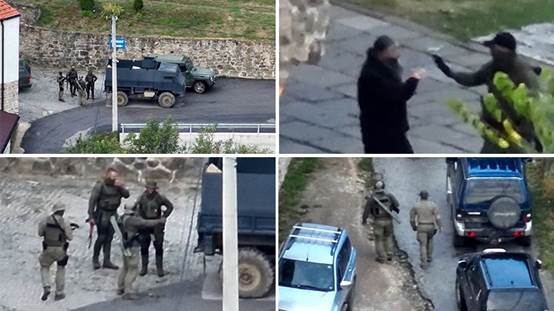
Return of Serb paramilitaries in north Kosovo, 24 September 2023
The vanishing Serb community
Vucic does not stop at false claims of crimes against humanity. He also argues in his letters that Kosovo must not join the Council of Europe because (put in bold): “MORE THAN 15 % OF THE SERB POPULATION LEFT THE SO-CALLED KOSOVO.”
Vucic has made these claims before. On 5 October 2023, he explained that, because of “Albanian terror”, 11 percent of Kosovo Serbs had left Kosovo since early 2021. On 8 February 2024, speaking at the UN Security Council, Vucic referred to “14 percent” who had left in just one year. Now it is more than 15 percent, in an unspecified period. His claim is not simply that Serbs are leaving Kosovo in high numbers but that this is the result of a state policy to create unbearable living conditions; that it is the fault of the Kosovo government.
To put this debate on a solid basis, ESI examined this argument in a recent paper:
NEW ESI background paper:
Invented pogroms – Statistics, lies and confusion in Kosovo
(19 February 2024)
In fact, official administrative data coming from Serbian (!) public sources, reveals a striking reality. Yes, there has been a dramatic population decline from 2002 to 2024 of around 22 percent: from some 129.000 people to 100,000. There has been an even stronger decline in the number of primary school students in the two decades from 2004 to 2024 by around 26 percent. If these trends continue, there is a likelihood that the community will eventually disappear. This is a serious concern.
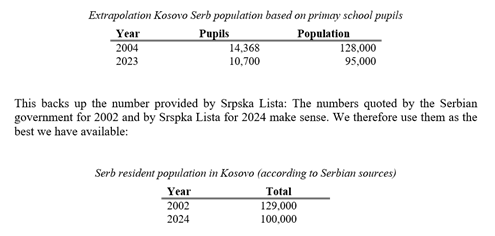
Sources and facts: Invented Pogroms (2024)
There is, however, a regional context for this. Let us broaden the perspective. From 2002 to 2022, the population of Serbia declined by 851,000 people, from some 7.5 to 6.6 million, or by 11 percent. Trends in the 25 administrative districts of Serbia (Serbian: “okrug”) show that there has been a decline of at least 20 percent in 13 of 25 districts. In fact, there has been an even bigger population decline in 8 (!) districts in Serbia, with a combined population of one million people in 2022, than among Kosovo Serbs. Looking at Serbian districts next to Kosovo we see that these, with a combined population of 662,000 in 2022, lost 167,000 people or 20 percent.

Things are even more striking when one looks at the young. The decline in the number of Serb primary school pupils in Kosovo is dramatic (26 percent). But looking at the 25 districts in Serbia shows that there has been a bigger decline in the number of pupils in 22 of 25 (!) districts than in Kosovo Serb schools. And the number of pupils in the majority-Serb entity in Bosnia and Herzegovina, a unit within a federal state with substantial powers, shows an even bigger decline. In schools in Republika Srpska, the number of pupils shrank by 32 percent in less than two decades. Here the president is called Milorad Dodik, not Vjosa Osmani.
The big picture is stark: Official administrative data shows a collapse in the Serb population both in Serbia and in Kosovo, and even more so in Bosnia. The decline is most dramatic in peripheral regions, such as the South of Serbia (bordering Kosovo). The question for policy makers in Belgrade, Banja Luka and North Mitrovica is how to overcome such a catastrophic dynamic that feeds on the continued isolation and economic backwardness of Serbia, Republika Srpska and Kosovo.
Keeping Kosovo and its Serb minority out of international institutions dedicated to the protection of their human rights is a bizarre way to try to reverse this trend. What is certain: rhetoric about invented pogroms is more likely to accelerate than to reverse this population decline. So are fears about potential armed conflict.
Post-accession conditions as farce?
In his letter to EU leaders, Vucic makes a fourth argument. He warns that the very idea in the Bakoyannis report that Kosovo has committed itself to implement some things after joining the Council of Europe is unacceptable. Why, Vucic asks, does PACE speak of “post-admission conditions”?
“Of course, it is absolutely clear that this hybrid expression means that there are actually no conditions …this concept directly undermines the credibility of the Council of Europe and actually refers to a fact that the so-called Kosovo will not essentially have any obligations …”
This raises an interesting question. How does the president of Serbia perceive Council of Europe membership? Once a country has joined the institution all leverage disappears and there are no longer any real conditions? (Serbia also joined the Council of Europe in 2002 with post-accession conditions: PACE Opinion 239).
This argument suggests that there is no point to the work of PACE or of the European Court of Human Rights and its judgements, as they occur post-accession. It is a counsel of despair that members of the Committee of Minister cannot take seriously.
An association of Serb municipalities
To sum up: Given that …
… all “relevant bodies of the Council of Europe” recommend Kosovo’s accession.
… claims of systematic terror against Kosovo Serbs are not based on any evidence.
… public “terror” therefore does not explain Kosovo Serb population decline.
… and the notion of “post-accession” conditions is based on the solid expectation that joining the Council of Europe is helpful for human rights protection …
… what arguments are left to convince member states not to follow the PACE recommendation and vote this May to let Kosovo join the Council of Europe; and thereby offer to all its people, including the Serb minority, the benefits of the most advanced human rights protection regime in the world?
There is one more argument. It is the magic wand of Vucic’s public diplomacy. In his letters to leaders it is also put in bold: Kosovo has failed to address “the most important question – FORMATION OF THE COMMUNITY OF THE SERB-MAJORITY MUNICIPALITIES (CSM)”. It is a familiar argument, widely raised, and deeply misleading.
First, because even if Kosovo would agree to the formation of such a Community, Serbia would almost certainly still oppose it joining the Council of Europe and campaign against it. But more importantly because what Vucic claims he wants no Kosovo government can deliver. His demand for the COMMUNITY OF THE SERB-MAJORITY MUNICIPALITIES (CSM) that he has in mind is a trap for Kosovo governments and international mediators alike.
Let us begin with the basic question: What is a Community of Serb-majority municipalities (CSM)? The Serbian word for “community” (also used here) is zajednica. Is there such a “community” (zajednica) of municipalities anywhere else that one might look at to better understand what we are talking about here? Well, yes: and we do not need to look very far.

Union (Zajednica) of Municipalities in Montenegro = an association
In Montenegro, Serbia’s neighbour, there is the Zajednica Opstina Crne Gore. It is usually translated into English as “Union of Municipalities of Montenegro”, but in Serbian/Montenegrin the word used could also be translated as “Community of Municipalities of Montenegro.” But here things get interesting. Legally, the Montenegrin Zajedinca is of course an association, under civil law, like all other such bodies across Europe.
This is also what PACE has called for in the case of Kosovo: the creation of an association of Serb-majority municipalities. Note that the PACE Opinion adopted last week makes no reference anywhere to a Community of Serb-majority municipalities (CSM) but issues a clear message that there should be an Association of Serb-majority municipalities (ASM).

Is a Community of Municipalities the same thing as an Association of Municipalities?
And if not, is it a thing at all?
The eminent lawyers, who looked at this issue in their November 2023 report for PACE, used the same language, writing only about an Association of Serb majority municipalities (ASM).

From the eminent lawyers report (November 2023)
The eminent lawyers explore the link between the demand for an ASM and Council of Europe standards in great detail, noting:
“The standards of the Council of Europe in the field of decentralisation and effective participation of minorities are relevant in the present case and include foremost the European Charter of Local Self Government.”
The lawyers point to Article 10 of the European Charter of Local Self-Government, which provides for the right of all local authorities to associate:
“1. Local authorities shall be entitled, in exercising their powers, to co-operate and, within the framework of the law, to form consortia with other local authorities in order to carry out tasks of common interest.
2. The entitlement of local authorities to belong to an association for the protection and promotion of their common interests and to belong to an international association of local authorities shall be recognised in each State.
This makes perfect sense. And everyone in the Council of Europe knows what an association is. Freedom of association is a core right in the European Convention on Human Rights. Article 11 of this Convention states:
„Everyone has the right to freedom of peaceful assembly and to freedom of association with others, including the right to form and to join trade unions. Anyone has the right to organise private or public meetings, associations and political parties.”
And this is why the PACE Opinion concludes:
“The Assembly considers the establishment of the Association of Serb majority municipalities an important step and a way to enhance the democratic participation and empowerment of Kosovo Serbs and ensure the protection of their rights. The Assembly considers that the establishment of the Association should feature in the Committee of Ministers’ future consideration of Kosovo’s application to accede to the Council of Europe, as a post-accession commitment for Kosovo.”
So far, so clear: Municipalities in European democracies have the right to create and join associations of municipalities. The European Charter of Local Self-government, a 1985 Council of Europe document, confirms this. There are many such associations in the Balkans. Municipalities in Kosovo have the same right. There is a Kosovo Law on Associations. There is a Kosovo Association of Municipalities (ASM), too.
Some existing associations of municipalities in the Western Balkans
Albanian Association of Municipalities
Association of Municipalities and Cities of the Federation of Bosnia and Herzegovina
Union of Municipalities and Cities of the Republic of Srpska
Union of Municipalities of Montenegro
Association of the Units of Local Self-Government of the Republic of North Macedonia
Standing conference of towns and municipalities – National association of local authorities in Serbia
Association of Kosovo municipalities.
But this is where things get interesting: Nothing stops any or all of the ten Serb-majority municipalities in Kosovo from creating their own Association of Serb-majority municipalities. To do so, they do not need the permission of the Kosovo government, the Serbian government, ambassadors in Pristina or the Council of Europe. They can do so now.
Freedom of association is a right and exercising it does not require governmental permission.
All of this is clearly stated in the Eminent Lawyers report. It underlines that:
“… following domestic and European legal standards, it should be possible to identify meaningful agreed ways of association for Serb-majority municipalities.
Some interlocutors expressed concerns that such an association could become an instrument of the Serbian authorities to intervene in Kosovo and might even be used for separatist purposes in view of the current situation in the north of Kosovo and in the Republika Srpska entity of Bosnia and Herzegovina.
It is legitimate to require that the statute of the association is in line with Kosovo legislation. There is also no obligation for Kosovo to accept that powers are granted to such an association which normally belong to central authorities. The delegation of additional powers by central authorities is of course possible upon agreement of the parties. The scope of the powers of municipalities is in any case quite wide and, according to Kosovo legislation, some Serb municipalities have, based on the Ahtisaari proposal, enhanced competencies in the area of secondary health care and education, and all Serb majority municipalities have enhanced competencies in the area of culture.”
The eminent lawyers concluded:
“There seems to be no legal reason why these municipalities should not be able, on a voluntary basis, to co-ordinate the exercise of their competencies and to pool in appropriate cases the exercise of these competencies, it being understood that there are limitations to such pooling since the Serb majority municipalities in the South have no contiguous territory. This approach is in line with the Ahtisaari plan which provided that “Municipal responsibilities in the area of their own and enhanced competencies may be exercised through municipal partnerships.””
However, it is also clear that in Council of Europe member states associations of municipalities are not set up by governments anywhere. Associations are set up by those who want to associate. Kosovo legislation allows this already. So why does it not happen?
This is where Vucic’s trap opens.
A political unicorn
Aleksandar Vucic has made international mediators forget what the Ahtisaari Plan (the basis for recognising Kosovo’s independence by these countries in 2008), Kosovo’s constitution, the European Charter on Local Self-government and the European Convention of Human Rights say and demand. He has endlessly repeated that this particular “Association/Community” must be completely unique, sui generis, different from any such associations anywhere else. And then he has kept repeating that it must also be imposed by decree by the Kosovo government.
The notion that a national government should associate from above autonomous units of local self-government, in particular in a case affecting a national minority, to the point of taking away exclusive powers of municipalities and ignoring their constitutional rights, is bizarre. The EU and its member states should not ask for it. In fact, they should oppose it, on the basis of Council of Europe standards that also already apply to Kosovo.
The only legitimate way to create any ASM lies with the Serb-majority municipalities that want to associate. But do they? Since 2013, no proposal for an ASM that respects Council of Europe standards has ever been presented. In fact, Serb-majority municipalities do not need to present a draft statute to the Kosovo government; they could, if they wanted to, just draft one (that respects the Kosovan constitution and Law on Local Self-Government) and apply to be registered in accordance with the Law on Associations. They can even call their association a Community/Zajednica, as in Montenegro. Serb-majority municipalities have this right. They must only exercise it.
Instead, in an amazing case of political hypnosis, Serbia’s president has made many think:
First, that there is such a thing as an association of municipalities imposed from above. In fact, this is a political unicorn, something that exists nowhere else in Europe.
Second, that it is up to him to judge on behalf of these municipalities what is an acceptable ASM, given that there are no elected Serb leaders in the four Serb-majority municipalities in the North since late 2022; these local leaders have resigned and have boycotted re-elections since. Without elected local leaders who want an association, setting it up in line with Council of Europe standards is impossible.
Third, that it is an obligation of the Kosovo government to create this unicorn-ASM. And that it has failed to do so for years.
Fourth, that without such an ill-defined unicorn-ASM, Kosovo Serbs and Serb-majority municipalities in Kosovo lack basic minority rights and meaningful local self-government. When in reality, a Serb-majority municipality has many more rights than municipalities in almost any other European country today, including the right to manage health care and education institutions, to use Serbian curricula, to get financial support from Serbia, to form an association of municipalities and engage in inter-municipal cooperation. These rights exist now.
And fifth, that because “there is no association of Serb-majority municipalities yet” Kosovo needs to be punished and should be blocked from joining Europe’s preeminent human rights organisation.

Aleksandar Vucic’s style of political argument
This has been a masterpiece of political hypnosis. One must only hope that no European government in the Committee of Ministers falls for it. To block Kosovo accession over a failed hunt for a political unicorn would be a low point in the history of this institution.
Yours sincerely,

Gerald Knaus


Fantastic beasts
Vucic’s ASM: something that exists nowhere.
MORE: What associations of municipalities are (not)
In April 2013, in the First Agreement, reached in Brussels between Kosovo and Serbia and ratified by the Kosovo parliament in June that year, both (!) parties committed itself to a goal: “There will be an Association/Community of Serb majority municipalities in Kosovo.“ And: “The structures of the Association/Community will be established on the same basis as the existing statute of the Association of Kosovo municipalities …”
In August 2015, EU High Representative Federica Mogherini wrote a letter to explain how the European Union understood the ASM mentioned in the 2013 First Agreement: it “will not have executive powers.”
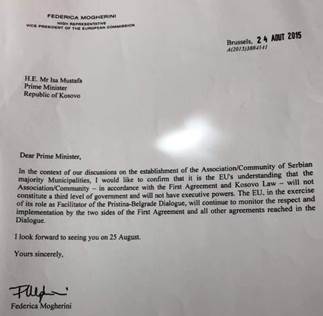
In December 2015, the Kosovo Constitutional Court issued a judgement on the ASM, referring to Article 12 of the Kosovo Constitution, which defines municipalities as “the basic territorial unit of local self-governance in the Republic of Kosovo”:
“Moreover, the Court finds that … the legal act and the Statute of the Association/Community shall not replace or undermine the status of the participating municipalities as the basic units of democratic local self-government within the meaning of Article 12 and Chapter X of the Constitution.”
In January 2023, US State Department adviser Derek Chollet and US Special Envoy for the Western Balkans, Gabriel Escobar, wrote about the ASM:
“What the Community would not be? It would not add a new level of executive and legislative power to the Government of Kosovo. This important principle dates back to Ahtisaari's proposal. Municipalities cooperate in the joint management of jurisdictions within the framework of legitimate Kosovo institutions and structures. Allowing certain municipalities to more effectively exercise the powers they already have … “
„What would the Community look like? Municipalities with common interests, language and culture could work together more effectively to solve common challenges in providing public services, through economies of scale and the exchange of best practices. For example, municipalities will be able to design curricula and programs in the Serbian language for local schools in some municipalities, rather than working in a vacuum and doing double work.”
In February/March 2023, in the so-called Brussels/Ohrid Agreement the words Association or Community of Serb-majority municipalities do not appear. Again, both (!) parties commit themselves to “ensure an appropriate level of self-management for the Serbian community in Kosovo and ability for service provision in specific areas, including the possibility for financial support by Serbia.”
In December 2023, US Ambassador to Kosovo Jeffrey Hovenier repeated:
“The US position has been clear. We believe that the Association of Serb-Majority Municipalities should be consistent with Kosovo’s current constitution, should be consistent with the Constitutional Court’s decision, that it should not be the third layer of government and that it should not have executive authorities. We don’t want another Republika Srpska, we don’t want something that would negatively affect the good functioning of the state of Kosovo.”
On 22 March 2024, in the list of post-accession commitments sent to PACE by Kosovo’s three leaders, they committed themselves to “take substantial and tangible steps with a view to implementing all articles of the Brussels and of the Ohrid Agreements which includes establishing the Association of Serb majority municipalities as soon as possible.”
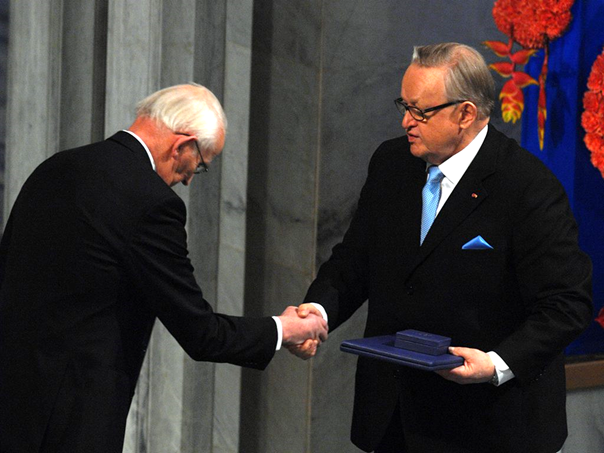
The great mediator and his prize
MORE: Martti’s legacy
On 17 February 2008, 109 members of the Kosovo parliament declared:
“We, the democratically-elected leaders of our people, hereby declare Kosovo to be an independent and sovereign state. This declaration reflects the will of our people and it is in full accordance with the recommendations of UN Special Envoy Martti Ahtisaari and his Comprehensive Proposal for the Kosovo Status Settlement …”
This declaration referred to Martti Ahtisaari’s Comprehensive Proposal, which included the following points concerning decentralisation and self-management – since incorporated into Kosovo’s constitution and legislation:
“The proposal focuses in particular on the specific needs and concerns of the Kosovo Serb community, which shall have a high degree of control over its own affairs. The decentralization elements include, among other things: enhanced municipal competencies for Kosovo Serb majority municipalities (such as in the Main provisions of the Comprehensive Proposal for the Kosovo Status Settlement areas of secondary health care and higher education); extensive municipal autonomy in financial matters, including the ability to receive transparent funding from Serbia; provisions on inter-municipal partnerships and cross-border cooperation with Serbian institutions; and the establishment of six new or significantly expanded Kosovo Serb majority municipalities.”
“Based upon the principles of the European Charter of Local Self-Government, municipalities shall be entitled to cooperate and form partnerships with other Kosovo municipalities to carry out functions of mutual interest, in accordance with the law.
Municipal responsibilities in the areas of their own and enhanced competencies may be exercised through municipal partnerships, with the exception of the exercise of fundamental municipal authorities…
Municipal partnerships may take all actions necessary to implement and exercise their functional cooperation through, inter alia, the establishment of a decision making body ... Partnership decisions and activities shall be subject to reporting requirements to the competent central authority …
Based upon the principles of the European Charter of Local Self-Government, municipalities shall be entitled to form and participate in an association of Kosovo municipalities for the protection and promotion of their common interests, in accordance with the law.
Membership in such associations shall be limited to Kosovo municipalities. Such associations may cooperate with their international counterparts. Such associations may offer to its members a number of services, including training, capacity building, technical assistance, research related to municipal competencies and policy recommendations.
Municipalities shall be entitled to receive financial assistance from the Republic of Serbia, subject to the following provisions: Any financial assistance to Kosovo municipalities from the Republic of Serbia shall be limited in their purpose to the exercise of a municipality’s responsibilities in the areas of its own competencies, and shall be transparent and made public.
Municipalities may receive financial assistance from the Republic of Serbia through accounts in commercial banks, certified by the Central Banking Authority of Kosovo. Any receipts shall be notified to the Central Treasury. Municipalities receiving financial assistance from the Republic of Serbia shall report this assistance, together with the corresponding expenditures, in their municipal budgets …”

